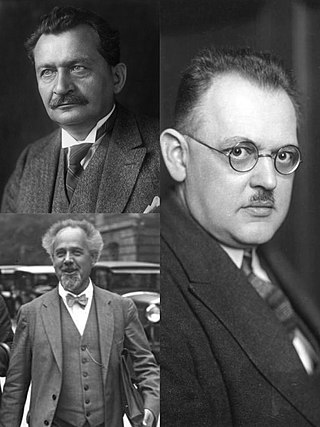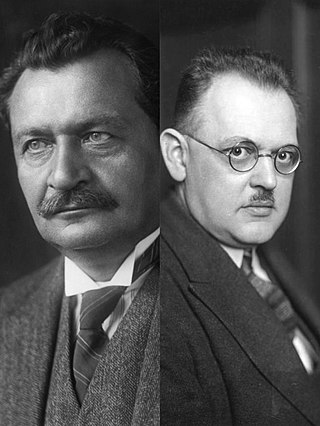
The 1918 United Kingdom general election was called immediately after the Armistice with Germany which ended the First World War, and was held on Saturday, 14 December 1918. The governing coalition, under Prime Minister David Lloyd George, sent letters of endorsement to candidates who supported the coalition government. These were nicknamed "Coalition Coupons", and led to the election being known as the "coupon election". The result was a massive landslide in favour of the coalition, comprising primarily the Conservatives and Coalition Liberals, with massive losses for Liberals who were not endorsed. Nearly all the Liberal MPs without coupons were defeated, including party leader H. H. Asquith.
The Reform Party, formally the New Zealand Political Reform League, was New Zealand's second major political party, having been founded as a conservative response to the original Liberal Party. It was in government between 1912 and 1928, and later formed a coalition with the United Party, and then merged with United to form the modern National Party.

The 1919 Ontario general election, held on October 20, 1919, elected 111 Members of the 15th Legislative Assembly of Ontario ("MLAs"). The United Farmers of Ontario captured the most seats but only a minority of the legislature. They joined with 11 Labour MPPs and three others to form a coalition government, ending the 14-year rule of Ontario's Conservatives. This is one of the few examples of coalition government in Canadian history.

The 1923 Ontario general election was the 16th general election held in the Province of Ontario, Canada. It was held on June 25, 1923, to elect the 111 Members of the 16th Legislative Assembly of Ontario ("MLAs").

Federal elections were held in Germany on 20 May 1928 to elect the fourth Reichstag of the Weimar Republic.

The 1920 German federal election was held on 6 June 1920 to elect the first Reichstag of the Weimar Republic. It succeeded the Weimar National Assembly elected in January 1919, which had drafted and ratified the republican constitution. The election was delayed in three electoral districts – Schleswig-Holstein and East Prussia until 20 February 1921, and Upper Silesia (Oppeln) until 19 November 1922 – due to territorial plebiscites.
The 15th Legislative Assembly of Ontario was in session from October 20, 1919, until May 10, 1923. The parliament was elected in the 1919 Ontario general election and was dissolved prior to the 1923 general election. The leading party in the chamber after the election was the United Farmers of Ontario (UFO). It formed a coalition government with 11 Labour MLAs and three Independent candidates of varying stripes.
The 1940 Middlesbrough West by-election was a parliamentary by-election held on 7 August 1940 for the British House of Commons constituency of Middlesbrough West.
The Coalition Coupon was a letter sent to parliamentary candidates at the 1918 United Kingdom general election, endorsing them as official representatives of the Coalition Government. The 1918 election took place in the heady atmosphere of victory in the First World War and the desire for revenge on Germany and its allies. Receiving the coupon was interpreted by the electorate as a sign of patriotism that helped candidates gain election, while those who did not receive it had a more difficult time as they were sometimes seen as anti-war or pacifist. The letters were all dated 20 November 1918 and were signed by Prime Minister David Lloyd George for the Coalition Liberals and Bonar Law, the leader of the Conservative Party. As a result, the 1918 general election has become known as "the coupon election".
The 1919 Kingston upon Hull Central by-election was a parliamentary by-election held for the British House of Commons constituency of Kingston upon Hull Central on 29 March 1919. The by-election was the fifth to be held during the 1918-1922 parliament.
The 1919 Aberdeenshire and Kincardine Central by-election was a parliamentary by-election held for the British House of Commons constituency of Aberdeenshire and Kincardineshire Central on 16 April 1919.
The 1920 Middleton and Prestwich by-election was a by-election held on 22 November 1920 for the British House of Commons constituency of Middleton and Prestwich in Lancashire.
The 1919 St Albans by-election was a parliamentary by-election held in England in December 1919 for the House of Commons constituency of St Albans in Hertfordshire.
The National Liberal Party was a liberal political party in the United Kingdom from 1922 to 1923. It was created as a formal party organisation for those Liberals, led by Prime Minister David Lloyd George, who supported the Coalition Government (1918–22) and subsequently a revival of the Coalition, after it ceased holding office. It was officially a breakaway from the Liberal Party. The National Liberals ceased to exist in 1923 when Lloyd George agreed to a merger with the Liberal Party.
The 1919 Spen Valley by-election was held on 20 December 1919. The by-election was held after the death of the incumbent Coalition Liberal MP, Thomas Whittaker. It was won by the Labour candidate, Tom Myers, who had contested the constituency at the 1918 general election. The 1918 contest had been a straight fight between Whittaker and Myers, and had seen the former emerge victorious with a majority of 2,156 votes.
The 1919 Widnes by-election was held on 30 August 1919. The by-election was held due to the elevation to the peerage of the incumbent Coalition Conservative MP, William Walker. It was won by the Labour candidate Arthur Henderson.
The 1919 Bothwell by-election was held on 16 July 1919. The by-election was held due to the death of the incumbent Coalition Conservative MP, David Henderson Macdonald. It was won by the Labour candidate John Robertson.
The 1919 Oxford University by-election was held on 19–24 March 1919 after the incumbent Coalition Conservative MP, Rowland Prothero was created as the first Lord Ernle. It was retained by the Conservative candidate Prof. Charles Oman.
The 1920 Cardiff City Council election was held on Monday 1 November 1920 to elect councillors to Cardiff City Council in Cardiff, Glamorgan, Wales. It took place on the same day as many other local elections in Wales and England.





